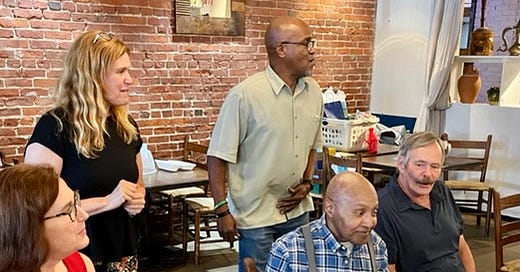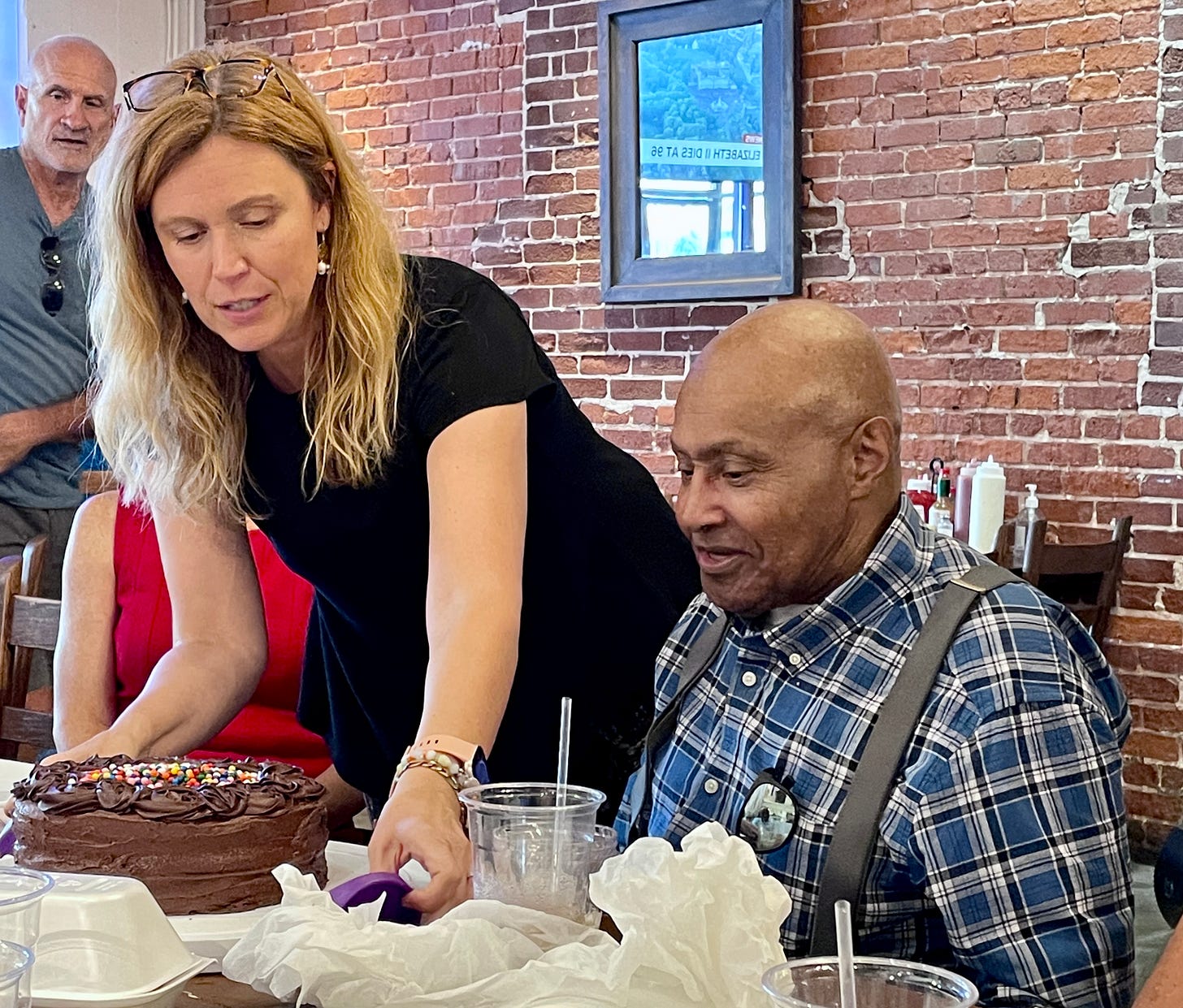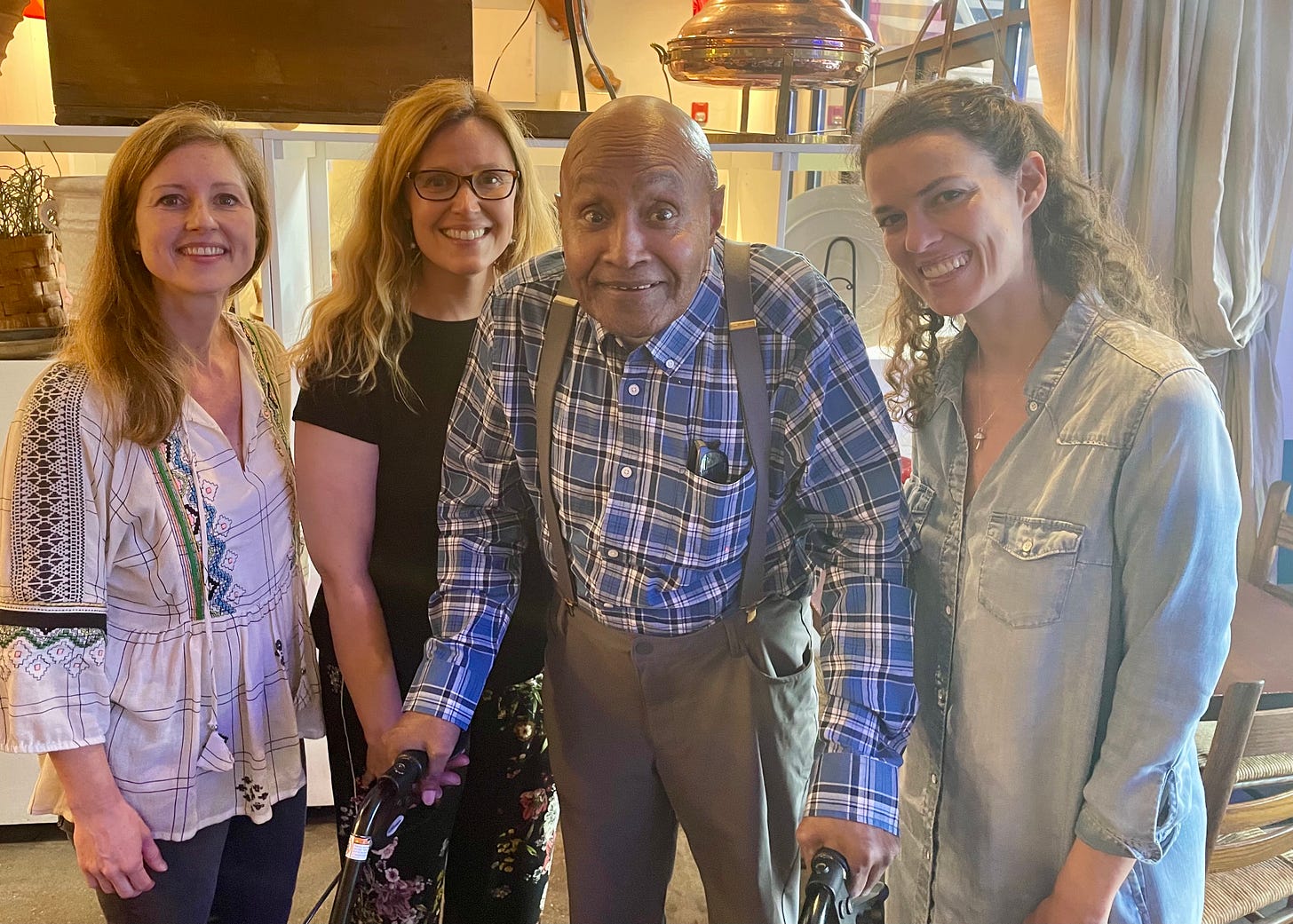(L-R: Carla Crowder, me, Ronald McKeithen, Robert Cheeks, Michael Schumacher)
The highlight of last week for me was celebrating the 80th birthday of Mr. Robert Cheeks. I had the honor of baking him a German chocolate cake (his request) and sitting across the table from this delightful man as we shared lunch with over a dozen others invited to this incredible celebration.
The men in the photo above together served over 110 years combined in Alabama prisons. They were all sentenced to die in prison under our state’s hideous habitual offender law until the lawyer in the red dress, Carla Crowder with Alabama Appleseed, got them out. With the sheer force of a superhero, she successfully argued their punishments were excessive for crimes that left no one physically injured.
“I didn’t know so many people liked me,” Mr. Cheeks exclaimed, a wide smile on his face after we sang happy birthday. He’s a darling man that way—bright sense of humor, mind sharp as a pin, an earnest cheerfulness and kindness that, in all honesty, the world does not deserve from him. Knowing the way he was thrown away and forgotten makes his buoyant joy a singular testament to the grace he embodies.
(Fussing over Mr. Cheeks birthday cake was a privilege for me)
Mr. Cheeks was incarcerated for 37 years after being arrested for an impulsive and clumsy bank robbery in 1985. He had three prior forgery convictions on his record dating back to 1969, and told me his court-appointed attorney called no witnesses at his trial. He was summarily convicted and Alabama stuck him on the habitual offender law’s conveyer belt to a life without parole sentence.
I wrote about Mr. Cheeks, along with the other two men in the photo, Ronald McKeithen and Michael Schumacher, in a piece I published in the Daily Beast in September 2020. At the time, all of them were still in prison with no hope of release—Ron and Mr. Cheeks at Donaldson Prison in Bessemer and Michael down south at Holman Prison, adjacent to the state’s death row.
The marvel that these three men are now all out of prison and thriving feels sacred.
One of the attendees of the party for Mr. Cheeks was a woman named Pam Holmes. “How are your boys?” I heard Mr. Cheeks eagerly ask Pam. “How is your husband, Mr. Tim?”
Pam later told me she wrote Mr. Cheeks a letter in 2020 after she saw something about him online, maybe on my Twitter or Instagram. It was several months after the horrific murder of George Floyd and during the pandemic. Pam educated herself on Black history and demonstrated with Black Lives Matter. She felt sucker punched with the realization that much of what she knew about the nation’s history of racial discrimination barely scratched the surface.
“I had no idea about the Tulsa massacre, or that Rosewood, Florida happened,” Pam told me. “I think what got revealed is that people are hurting, their basic needs are not even being met.”
(L-R: Pam Holmes, me, Mr. Robert Cheeks and Maura McNamara)
Pam said sending a letter to Mr. Cheeks felt like an action step, a way to connect with a person in need, at the beginning of the pandemic when all of us were feeling disconnected. She had never written to anyone in jail or prison.
“I was able to write just to say hello, we’re in the same town and someone cares,” she said. “I just didn’t want him to feel alone.” Along with her letter, she shared details about her life in Shelby County and some knock-knock jokes she thought matched her own father’s sense of humor.
It would be months before she heard back because when Pam sent her letter, Mr. Cheeks was at Brookwood Hospital being treated for cancer. He was finally able to write her back when he returned to Donaldson prison and was recovering in the prison infirmary.
“Dear Pam, hi to you, dear friend,” he began the letter. His genuine kindness grabbed her. Pam decided to write Mr. Cheeks on a regular basis. They exchanged letters about once a month until he was released over the summer. Before his birthday party, Pam was able to talk to Mr. Cheeks on the phone and then visit him at the nursing facility where he now lives.
“It was wonderful to see him in person” she said. “Meeting him this way has really been beautiful.”
I often feel a sense of futility in writing about Alabama’s habitual offender law and the lives it threw away. To publicize outsized sentences like Mr. Cheeks’ and then hear nothing but silence in response from state leaders is infuriating. But meeting Pam at his birthday party gives me hope.
It made me realize that change comes one person at a time. One life at a time. One heart at a time. And his party showed me a real community, one built through mutual work, respect and love. That Mr. Cheeks offers that to all of us is the best of humanity, an example for all of us to celebrate and follow.







Beth, your story breaks my heart. I love you for your dedication.
Again Mrs Shelburne you've outdone yourself! We never know the end of a matter when we take the first committed step. The result, if favorable, always grants an amount of gratitude that's well deserving. In more ways than one, you are affecting lives, in and out of prison. Don't give up! No you're not seeing the desired fruits of your labor, but rest assure that your efforts are not going unnoticed- here on earth and definitely in heaven...I can't wait until God says, "Beth it's time, here's what you've worked and prayed for..." and blesses your heart to the full...